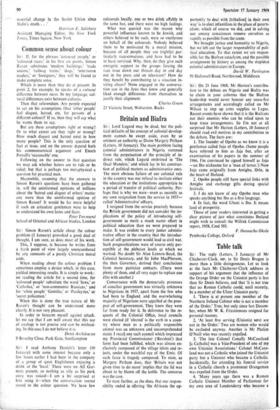Britain and Biafra
Sir: Lord Lugard may be dead, but the poli- tical defaults of his concept of colonial develop- ment cannot, be swept aside, even by so eminent an authority as Dame Margery Perham (Letters, 10 January). The main problem facing colonial administrators in Nigeria stemmed from the perpetuation of the principle of in- direct rule, which Lugard enshrined in 'The Dual Mandate,' and which lay in his construc- tion of political matters as administrative ones. The most obvious failure of our colonial rule in the country was our refusal to institute either the education or the institutions appropriate to a period of transfer of political authority. Per- haps that is why we were—even as recently as my own resignation from the service in 1957— called 'Administrative' officers.
I resigned from the service precisely because the British government did not consider the im- plications of the policy of introducing self- government to merit a much vaster effort in political education than we were prepared to make. It was evident to every junior adminis- trative officer in the country that the introduc- tion of self-government would lead to civil war. Such prognostications were of course only per- ceptible at the plebeian levels at which we worked. No doubt Sir Alan Lennox-Boyd, the Colonial Secretary, and Sir John MacPherson, the then Governor, derived their conclusions from more patrician contacts. (There were plenty of them, and all very eager to replace one elite with another.) Conversance with the democratic processes of conciliar government was virtually unknown to Nigerians in 1957, apart from the few who had been to England, and the overwhelming majority of Nigerians were appalled at the pros- pect of self-government. They knew they were far from ready for it. In deference to the re- quests of the Colonial Office, local councils were elected (if 'elected' is the verb in a coun- try where man as a politically responsible animal was an unknown and uncomprehended state). I recall one such council which impressed my Provincial Commissioner ('Resident') that form had been fulfilled, which was almost ex- clusively composed of the village idiots and re- jects, under the watchful eye of the Emir. Of such farce is tragedy composed. To state, as Margery Perham does, that 'Britain was not given time to do more' implies that the lid was about to be blown off the kettle. The converse was the case.
To state further, as she does, that our respon- sibility ended in offering 'the Africans the op- portunity to deal with [tribalism] in their own way' is to elect infantilism in the place of patern- alism; which of course we did, and in salving our uneasy consciences remove ourselves as rapidly as possible from the scene.
We brought justice and humanity to Nigeria, but we left out the larger responsibility of poli- tical education. To that extent we are respon- sible for the Biafran cataclysm, and the possible arraignment by history as among the stupidest colonial administrators in Europe.


































 Previous page
Previous page